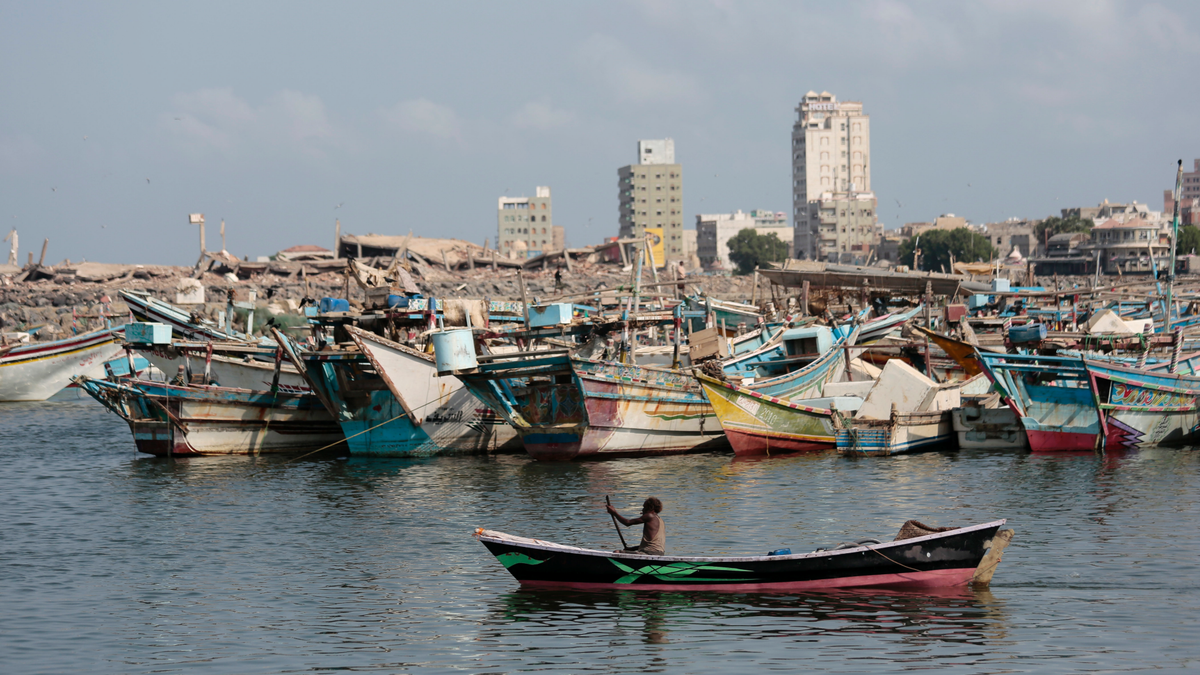
FILE - In this Friday Sept. 28, 2018 file photo, a fisherman paddles his boat past destroyed buildings on the coast of the port city of Hodeida, Yemen. Amnesty International said warned late Wednesday. Nov. 7, 2018 that Yemen's rebels have taken up positions on a hospital rooftop in the contested Red Sea city of Hodeida that a Saudi-led coalition is trying to capture. This raises concerns the Shiite rebels, known as Houthis, plan to use the patients at the Hodeida hospital as human shields to ward off airstrikes from the coalition. Amnesty is urging the warring sides to protect civilians. (AP Photo/Hani Mohammed, File)
SANAA, Yemen – Most of the population of Yemen's Hodeida has been forced to flee amid a Saudi-led coalition offensive to take the key Red Sea port city from Shiite rebels, the United Nations' refugee agency said Friday, as fierce battles continue to rage in the area.
Nearly three quarters of Hodeida's estimated 600,000 people have escaped since June, a figure that underscores the dire situation in the city that serves as the main entry point for food and aid, the UNHCR said. It also expressed concern over the safety of those trapped in Hodeida as the intensified military operations "are increasingly confining populations and cutting off exit routes."
Yemeni government forces covered by the coalition's air and naval forces continue to engage in heavy fighting with the rebels, known as Houthis. The fighting has killed dozens of combatants from both sides, with dozens of military vehicles destroyed or burning along the front lines.
In a Friday statement, Yemen's internationally recognized government based in the southern city of Aden said its forces are advancing toward the north and west of Hodeida and across all fronts with cover from the coalition.
The fighting around the city, a vital lifeline for most Yemen's population, threatens to worsen Yemen's already-dire humanitarian situation and risks the obstruction of crucial assistance to the country endangering the lives of millions of Yemenis.
The Saudi-led coalition intervened in Yemen in March 2015 with the aim of defeating the Iran-aligned rebels and to restore the government of Abed Rabbo Mansour Hadi. But the coalition has recently come under mounting international pressure to end the war that has resulted in what the U.N. says is the world's worst humanitarian crisis.
Also on Friday, the Norwegian Refugee Council warned of the repercussions the continued fighting may have on millions of Yemenis. The council estimates the humanitarian cost of the war to have reached almost $3 billion in 2018 alone.
"We are now warning that by allowing this to go on, parties to the conflict and their international backers will be responsible for the death, injury and suffering of millions of people," Mohamed Abdi, the council's director in Yemen, said in a statement. "Senseless attacks on civilians, evidence of a starving population and desperate pleas from humanitarian witnesses have done little more than elicit condolences from an international community that could have stepped on the brakes long ago."
The U.S. and U.K., major arms suppliers to the Saudi coalition, have recently called for a cease-fire in Yemen and the launch of U.N.-led political talks to end the Saudi-Iran proxy war. On Friday, the U.N. special envoy for Yemen Martin Griffiths said on his official Twitter account that consultations with Yemen's warring parties to finalize logistical arrangements for a new round of peace talks are underway. Griffiths' latest effort to revive peace talks in September fell through after the Houthis failed to attend.




















